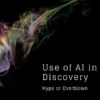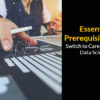I’m not from an IT background, can I still start my career in Data Science?
Data science is the future – there are no two ways about it. It’s pervasive and will be part of many, many career options – it is certainly already getting there now.
Some of the terms used in data science today may seem daunting to someone who isn’t from a technological background, and it’s not hard to see why. Some of those include “machine learning”, “deep machine learning systems”, “neural networks,” and more.
But they only seem to be, or sound complicated. In reality, they are just translated terms, which actually have their sources from terms we understand in our day-to-day lives, or that we may have come across, albeit in a different context.
The start of machine learning is primarily exactly what the words denote here – that machines have “learned” to do human tasks. This does not necessarily mean that they are all sentient beings as humans are, but can handle amounts of data that would be very difficult for humans to handle manually.
Think of it this way: say, you have to analyse user data from across millions of users across any social media. For the sake of an easy-to-understand example, let’s take Facebook, which many of us use on a daily basis – which will give us an easier understanding.
Say, X number of people from India, for example, use Facebook, daily. Most of us are familiar with the fact that companies use Facebook as a platform or avenue to advertise their goods and/or services – especially since many of us have seen these ads before ourselves.
But neither the company, nor Facebook themselves, can simply arbitrarily ‘show’ these ads to everyone on the platform, or the social media. Here’s where targeting comes in. This includes specific demographics, or groups of people, for whom the advertisement would be ideal.
So for an example, let’s take a cosmetic product, like a lipstick from a certain brand. Say a young woman, likely between the age of 16-28, would be the most likely audience for it.
The machine network will then analyse from the data that it has, users who are women. From there, it will narrow it down to female users in India. From there, it will narrow it down to female users in India from the age bracket which I have mentioned above. Then, from there, it will also analyse among those users, people who are likely to purchase cosmetics or have shown some sort of brand inclination, form their browsing habits, or general internet usage.
Considering many things – the sheer volume of users involved, plus the amount of data involving each of them, how time consuming this process would be if a human attempted to do this manually? It would quite literally take forever as there is an exponential amount of data on the internet – per person.
That’s one place where machine learning, and using artificial intelligence for systems to teach them to process this amount of information, comes from.
This is just one of many examples that are of practical use in the day-to-day life of a student, or a working professional, and in fact, many of us irrespective of our educational background. It is the real world problems for which we are searching for solutions in data science.
So, even though the words and terms themselves may seem daunting, the ‘machine’ solutions and AIs are all borne out of real-world issues – issues that you don’t necessarily have to have an IT background to comprehend or understand! Considering how heavily dependent the world today is on the internet, there is no doubt data science is the future. However, not knowing the big umbrella terms right away, or not being from a certain ‘stream’ or background in terms of education, study or work, need not defend anyone – because it is borne from practical issues, the solutions are both logical, and once you begin to understand even the most basic of concepts, newer ones will simply fall into place.
Data science is definitely the future – and you do not need to close off that avenue just because you are not from a traditional IT background – all you need is a critical, open mind and the thirst for knowledge to understand it.





